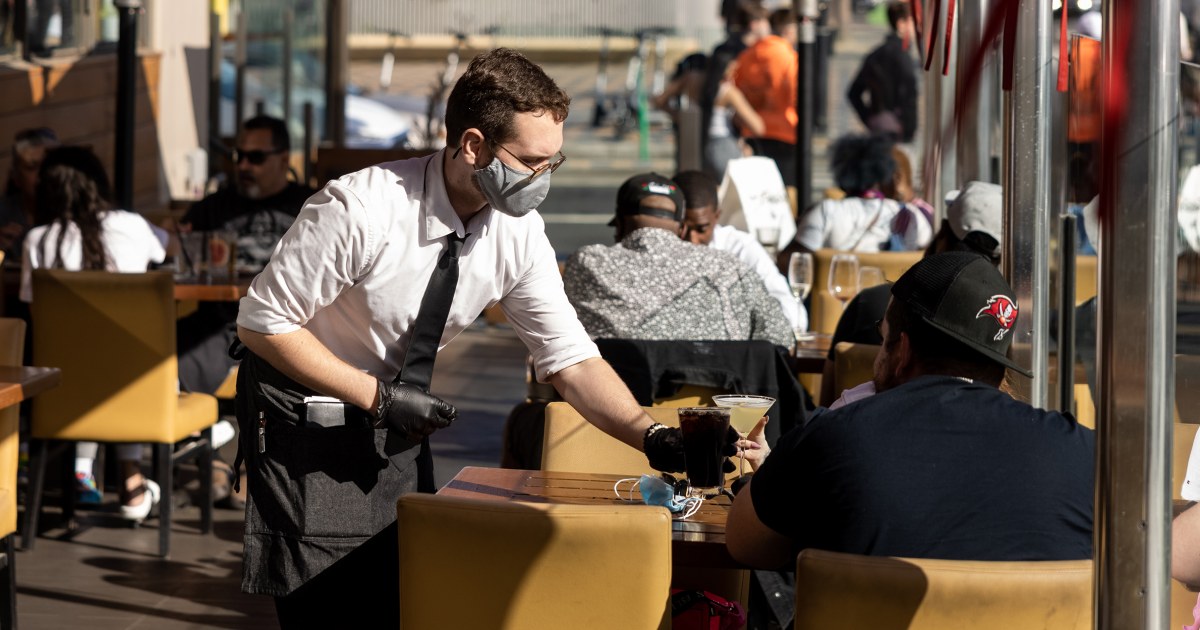
The labor market continued its robust recovery in February, as the economy added 678,000 jobs and the unemployment rate fell to 3.8 percent from 4 percent in January, according to new data from the Bureau of Labor Statistics. Economists polled by Dow Jones had expected an addition of 440,000 jobs.
The monthly report, which relied on data gathered before Russia invaded Ukraine, comes amid a dramatic drop in Covid-19 infections and after a surprisingly strong January report that showed 481,000 new jobs after upward revision. The labor force participation rate–essentially a measure of how many adults are working or actively looking for work–ticked up slightly to 62.3 percent from 63.2 percent. Wages continued to grow last month, but dipped slightly from 5.7 percent on an annualized basis in January to 5.1 percent.
“Expectations are that wage growth will continue to be strong,” said Nick Bunker, an economist and the head of research at the jobs platform Indeed. “That makes sense, given that we’re still in a very hot, strong labor market [and] employees have more bargaining power than they have in quite some time.”
Drew Matus, the chief market strategist at MetLife Investment Management, said, “We’ll probably see an acceleration of wage growth in the next two quarters at least.”
Since the labor market began its long climb back after it shed 22 million jobs in the spring of 2020, many of the largest wage gains have been in the lowest-paid sectors, with the rates of increase greatest among restaurant, hotel, store and warehouse workers.
There are indications now that the trend is widening to include more sectors and, more crucially, workers across a broader swath of the income spectrum.
“This is a case where wage growth began at the bottom of the wage scale and is moving up,” Matus said. “Now, the next step is the managers of those people are now saying, ‘Wait a sec.’”
It’s welcome news for workers whose paychecks have increasingly been eroded by inflation, which is at levels that haven’t been this high since the early 1980s. “The faster wage gains we’ve seen in 2021 have been a reflection of a very good trend for workers,” Bunker said. “They have the bargaining power to negotiate.”
But Daniel Zhao, a senior economist at the jobs site Glassdoor, predicted that the rapid pace of pay increases will begin to level off at some point this year.
“I do think that wage growth will moderate in 2022 but will continue to remain strong, because demand for workers exceeds supply, and many of the factors causing that are not likely to dissipate overnight. The disruptions from the pandemic are still around, on top of the demographic trends, like increased retirement and decreased immigration,” he said.
That having been said, whether higher wages can keep ahead of higher prices for food, gas and rent, as well as their potential to push up inflation, makes economists uneasy.
“For workers, hearing that higher wage growth is a negative because of inflation is not much of a balm. Workers care about the money that’s in their pockets,” Zhao said, noting that discussions about inflation on Glassdoor have jumped by a whopping 600 percent year over year. “Ultimately, it is something we know employees and workers are significantly concerned about.”
Giacomo Santangelo, an economist at Monster, said: “To some degree, our expectation is that future wage growth is going to drive some level of inflation. The rate at which prices are increasing has to slow down, and wage gains have to catch up.”
There are a couple of safety valves: the potential for greater productivity and the overwhelming preference of workers for more flexibility at their jobs.
Andrew Challenger, a senior vice president at the executive outplacement firm Challenger, Gray & Christmas, said one factor that appears to be holding back wage gains for more affluent workers is that a larger number are electing to wield their newfound bargaining power for perks rather than bigger paychecks.
“Employees at the higher end of the wage spectrum also have a lot of negotiating power, but a lot of them are using it to negotiate more autonomy, more flexibility and the ability to continue working from home,” he said. “It doesn’t show up in wages, but it’s part of compensation, and I think you’re seeing higher-wage workers using more of their negotiating power to fight for that aspect.”
Data backs up his observation: In a new survey of human resources professionals from Care.com, about 6 in 10 people who quit their jobs said in their exit interviews that one of the reasons was that they had sought greater flexibility.
While many companies are using higher pay to retain workers, experts say job-switchers are the ones snagging the biggest pay increases. As the churn associated with the “great resignation” begins to settle down, there will be fewer counteroffers and big signing bonuses.
And some labor market observers pointed out that employers might not mind paying more if people are working harder.
Employers [don’t] necessarily see wage growth as a negative. It has to do with overall productivity growth. If you have wage growth with no productivity growth, that’s a problem,” Matus said. “The productivity story is really one that’s crucial to determining whether wages feed into inflation or whether they’re just a positive benefit that workers receive.”
New BLS data found that productivity increased by 6.6 percent in the fourth quarter of last year, with output increasing by 9.1 percent. The BLS also noted that productivity was 4.1 percent above its fourth-quarter 2019 level.
“We’ll have to see what happens to productivity over the next few quarters,” Matus said. “I think the jury’s out on it.”
Source: | This article originally belongs to Nbcnews.com










